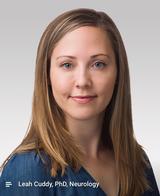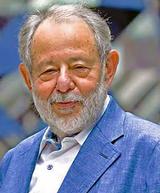Cognitive Neurology and Alzheimer's Disease Research
Below are labs and faculty investigating neurological diseases that interfere with cognition and behavior from basic science to clinical, social and behavioral investigations.
To learn about ongoing clinical trials or participate in a study, visit the clinical trials page for our Division of Behavioral Neurology.
Labs
Bonakdarpour LabDr. Bonakdarpour’s lab uses multimodal neuroimaging to study the underlying neural mechanisms of language impairment (aphasia) and impairment in other areas of cognition.
Dr. Bonakdarpour’s lab uses multimodal neuroimaging to study the underlying neural mechanisms of language impairment (aphasia) and impairment in other areas of cognition.
For more information about the Bonakdarpour Lab, please visit the Bonakdarpour Laboratory website.
Kahnt LabDr. Kahnt’s lab focuses on the neural and computational principles of reward-guided behavior.
Dr. Kahnt’s lab focuses on the neural and computational principles of reward-guided behavior.
Research Description
We study brain systems involved in learning, generalization and decision-making such as the striatum and the orbitofrontal cortex. For this, we use a combination of human psychophysics, computational models, fMRI and advanced multivariate analyses techniques borrowed from machine learning. This research may pave the way for understanding decision-making deficits in neurological diseases and should ultimately lead to novel diagnostic markers and treatment strategies for these disorders.
Publications
For more information visit the faculty profile of Thorsten Kahnt, PhD, or visit the Kahnt Lab website.
Contact Information
Thorsten Kahnt, PhD at 312-503-2896
Mesulam LabDr. Mesulam’s lab studies Alzheimer's disease and related disorders.
Dr. Mesulam’s lab studies Alzheimer's disease and related disorders.
Lab Description
As the director of the NIH-funded Cognitive Neurology and Alzheimer’s Disease Center (CNADC), Dr. Mesulam’s research focuses on cognition and aging. The CNADC’s research ranges from evaluating quality-of-life interventions for Alzheimer’s disease, to understanding the underlying molecular mechanisms of neurodegenerative diseases, and everything in between. Many of the research studies at the CNADC are related to primary progressive aphasia (PPA), a rare dementia syndrome characterized by the progressive loss of language abilities with relative sparing of other areas of cognition. As one of the top referral centers for PPA in the world, they maintain a large cohort of patients who are thoroughly studied using a variety of techniques, including MRI, ERP, and neuropsychological testing. All research patients have the opportunity to participate in the Brain Donation Program, which allows researchers to understand the link between clinical presentation and underlying neuropathologic disease.
Publications
For more information please see the faculty profile of M Marsel Mesulam, MD or visit the The Cognitive Neurology and Alzheimer’s Disease Center (CNADC) website.
Contact Us
Phone: 312-908-9339
Savas LabThe Savas lab aims to accelerate our understanding of the proteins and proteomes responsible for neurodevelopmental and neurodegenerative diseases.
The Savas lab aims to accelerate our understanding of the proteins and proteomes responsible for neurodevelopmental and neurodegenerative diseases.
Research Description
We use biochemistry with discovery-based mass spectrometry to identify the protein perturbations which drive synaptopathies and proteinopathies. Groups of perturbed proteins serve as pathway beacons which we subsequently characterizes in hopes of finding new pathogenic mechanisms and potential future therapeutic targets.
For more information view the faculty profile of Jeffrey Savas, PhD or the Savas Lab website.
Publications
Please see Dr. Savas's publications on PubMed.
Contact
Jeffrey Savas, PhD
Assistant Professor in Neurology
312-503-3089
Vassar LabDr. Vassar’s lab is studying the role of Ab and BACE1 in normal biological processes and in disease mechanisms of relevance to Alzheimer’s disease.
Dr. Vassar’s lab is studying the role of Ab and BACE1 in normal biological processes and in disease mechanisms of relevance to Alzheimer’s disease.
Research Description
Alzheimer’s disease (AD) is the leading cause of dementia in the elderly. The progressive degeneration of neurons in regions of the brain important for cognition causes the dementia that slowly robs AD patients of their memories, personalities and eventually their lives.
AD pathology is characterized by two microscopic brain lesions:
- Amyloid plaques: Extracellular deposits of the beta-amyloid peptide (Ab), and the longer 42 amino acid form, Ab42, which is strongly associated with autosomal dominant forms of familial AD
- Neurofibrillary tangles
Ab is generated from the amyloid precursor protein (APP) by endoproteolysis from two proteases called the b- and g-secretases. The b-secretase, a novel aspartic protease termed BACE1, was initially cloned and characterized by our group (Vassar, et al., 1999). BACE1 is required for the generation of all forms of Ab, including Ab42, and therefore is a prime drug target for the treatment of AD.
Our ongoing research focuses on the role of Ab and BACE1 in normal biological processes and in disease mechanisms of relevance to AD, including:
- The functions of BACE1 and the homologue, BACE2 and the cell biology of Ab in neurons
- The role of inflammation in AD pathophysiology
- Novel transgenic and knockout mouse models of AD
- Molecular changes that may occur during brain aging leading to neurodegeneration
For lab information and more, visit the Vassar Lab website or see Dr. Vassar's faculty profile.
Publications
See Dr. Vassar's publications on PubMed.
Contact
Phone: 312-503-3361
Research Faculty
Bonakdarpour, Borna
Associate Professor, Neurology (Behavioral Neurology)
Cahan, Joshua G
Assistant Professor, Neurology (Behavioral Neurology)
Cuddy, Leah
Research Assistant Professor, Neurology (Behavioral Neurology)
Gitelman, Darren R
Adjunct Lecturer, Neurology - Ken and Ruth Davee Department
Grant, Ian M
Assistant Professor, Neurology (Behavioral Neurology), Neurology (Hospital Neurology)
Lapins, Allison E
Assistant Professor, Neurology (Behavioral Neurology)
Mesulam, M Marsel
Professor, Neurology (Behavioral Neurology)
Professor, Weinberg College of Arts and Sciences
Sadleir, Katherine Rose
Research Associate Professor, Neurology (Behavioral Neurology)
Savas, Jeffrey N
Associate Professor, Neurology (Behavioral Neurology), Pharmacology, Medicine (Nephrology and Hypertension)
Vassar, Robert J
Professor, Neurology (Behavioral Neurology), Cell and Developmental Biology
Wang, Yi-Zhi
Research Assistant Professor, Neurology (Behavioral Neurology)
Dobrowolska Zakaria, Justyna
Research Assistant Professor, Neurology (Behavioral Neurology)











